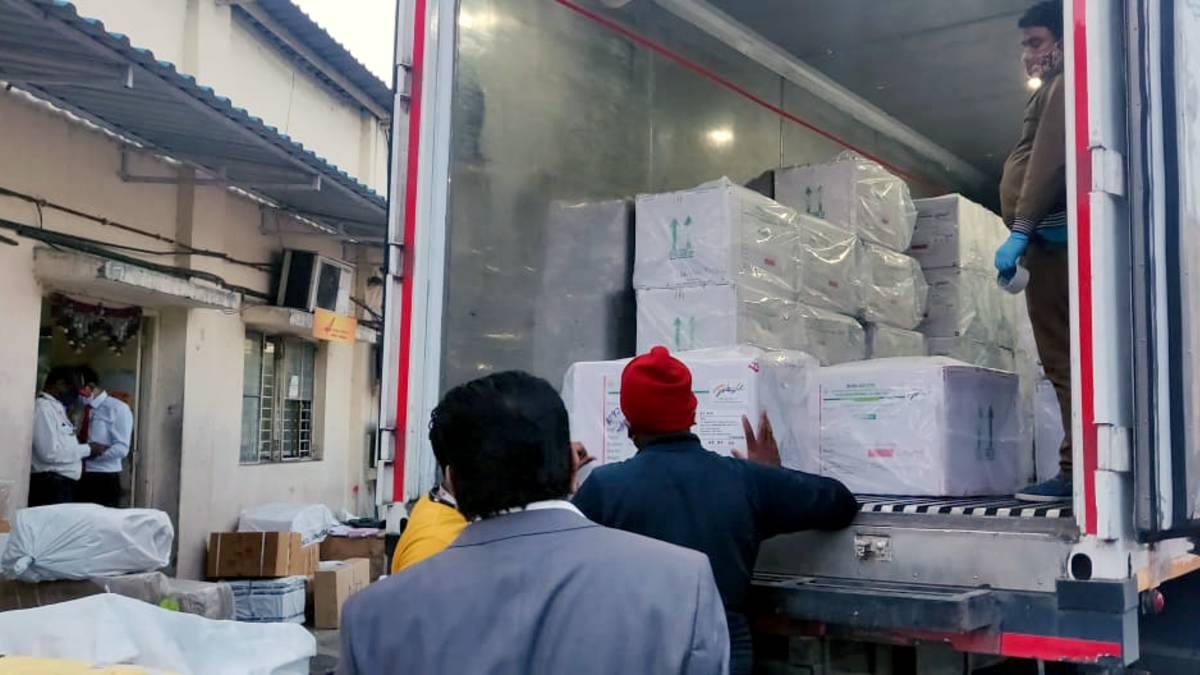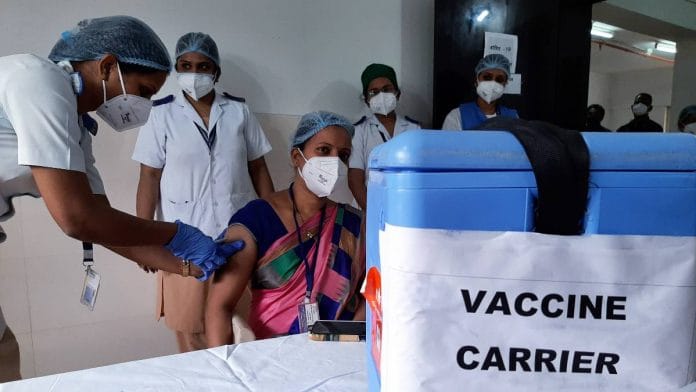New Delhi: India is all set to roll out the world’s largest vaccination drive from 16 January to inoculate 30 crore people against Covid-19 in the first phase. This after the Modi government on 3 January granted emergency-use authorisation to Oxford-AstraZeneca’s vaccine Covishield, manufactured by the Pune-based Serum Institute of India, and Bharat Biotech’s Covaxin.
ThePrint takes you through the massive exercise and all that it will entail.
Number of vaccines approved in India: 2
On 3 January, the government granted emergency-use authorisation to Covishield and Covaxin. Bharat Biotech has so far completed phase 1 and 2 trials, but phase 3 is underway across 25 centres in India and includes over 25,000 participants. SII completed enrolment for phase 3 trials in November.
Doses to be given out: 66 crore
Accounting for 10 per cent wastage, 66 crore doses will be required to complete the first phase of vaccination that covers 30 crore people. This is more than what is required to vaccinate the whole of England, that has a total population of 6.6 crore.
Each person will be given the vaccine in two doses with a 28-day interval in between. The effectiveness of the vaccine is expected to kick in only 14 days after receiving the second dose, the health ministry said Monday.
Doses procured: 165 lakh
According to the health ministry, the Modi government is procuring 110 lakh doses of Covishield from SII and 55 lakh doses of Covaxin from Bharat Biotech. The cost of the Covishield vaccine per vial is Rs 200 per dose. The cost of Covaxin is Rs 206 per dose.
India will follow the ‘HCQ model’, i.e., while there is “no ban” on distribution of vaccines to other countries, there are “restrictions” since the government will be procuring the vaccines to administer them to the public first.
Also read: Majority Indians have natural immunity. Vaccinating entire population can cause great harm
Priority beneficiaries: 30 crore
The government has determined four priority groups that will receive the Covid vaccination first.
The first two are healthcare providers and workers (HCWs) in healthcare settings, both government and private (numbering around 1 crore by government estimates), and frontline workers (around 2 crore), including personnel from state and central police departments, armed forces, home guard and civil defence organisations, besides municipal workers (excluding healthcare workers).
The other two groups are those aged over 50 years, and younger people with comorbidities.
Together, these groups comprise an estimated 30 crore people.
HCWs registered on Co-WIN: 70.33 lakh
According to a 25-slide presentation of the health ministry on ‘Preparedness for Covid-19 vaccine’, a total of 70,33,338 healthcare workers have been registered on the government developed mobile application ‘CoWIN’ to kickstart the vaccination process. CoWIN is being used to track the entire vaccination process, from the time a person registers for the shot to when they receive it to tracking the after-effects.
The presentation, dated 31 December, has been accessed by ThePrint.

Vaccinators registered on Co-WIN: 2.34 lakh
According to the same presentation, 2,34,421 vaccinators have been registered as well as 51,459 government and 1,62,933 private health care facilities.
Personnel trained during national level Training of Trainers: 2,360
This includes state immunisation officers, cold chain officers, IEC (Information Education and Communication) officials, development partners and more.
The health ministry said last month that it had started training medical officers, vaccinator officers, alternative vaccinator officers, cold chain handlers, supervisors, data managers and ASHA coordinators.
Personnel trained in local level training: Over 6 lakh
More than 61,000 programme managers, 2 lakh vaccinators and 3.7 lakh other vaccination team members have been trained so far as part of training at states, districts and block levels.
Also read: Who all will get vaccines free? When will they hit stores? 4 Covid questions on every mind
Storage of vaccines: 29,000 cold chain points
The health ministry last month said 29,000 cold chain points, 240 walk-in coolers, 70 walk-in freezers, 45,000 ice-lined refrigerators, 41,000 deep freezers and 300 solar refrigerators will be used for storing the Covid-19 vaccines.
According to the ministry, all this equipment has already been supplied to states in the last month. Twenty three ministries at the Centre and states had also been identified and given the task of planning and implementing the vaccination roll out drive.
Vaccine storage: 4 primary stores, 37 state stores
There are four Government Medical Store Depots (GMSD) at Karnal, Kolkata, Chennai and Mumbai. Overall, there are 37 vaccine stores in the country. These store vaccines in bulk and will distribute the shots further, said the health ministry on 5 January.
Transportation: 71.22 lakh doses by air
India started transporting vaccines by air Tuesday with all Indian airlines transporting the vaccines. According to the health ministry, 54.72 lakh doses of Covishield have been transported as of 4pm on 12 January.
Transportation of all doses will be completed by 14 January.
The first consignment of 16.5 lakh doses of Covaxin were transported Wednesday from Hyderabad to New Delhi via an Air India flight.
Also read: In a pandemic, vaccine approval considerations have to change — top ICMR scientist on Covaxin






